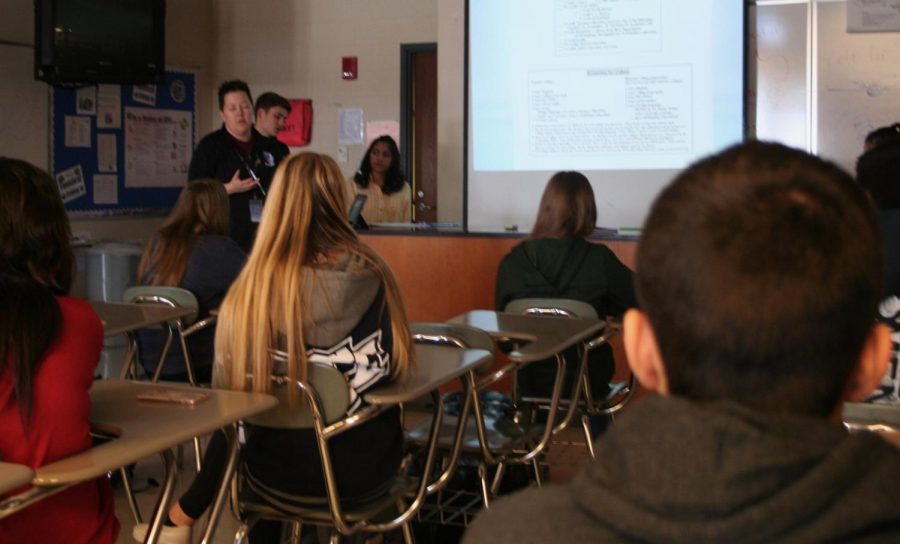F.A.M.E.ous or inF.A.M.E.ous?
Honest opinions on the freshman program
Photo by Photo by Ellie Melvin
Freshmen are given a presentation on sophomore course selection from their counselor. Students building a relationship with their counselors early on is one of the perks to F.A.M.E., according to Krause.
F.A.M.E. is becoming infamous. The program’s lengthy run and repetitive lessons are earning it a poor name among the freshman class. But is it really all that bad?
Freshmen Achieving Maximum Excellence (F.A.M.E.) was designed to aid freshmen with their transition into high school, covering topics from how to calculate your GPA to social and emotional awareness. The idea is to set students up with the mindset and skills to have a successful high school career.
“I’ve always thought [F.A.M.E.] was very valuable,” Carl Krause, counselor, said. “I still do. I like that [freshmen] get to participate in it for part of the time, because I get to meet kids I would never have met normally until they’re older. I think students’ attitudes have been better [too].”
Some of the program’s lessons focus on the vital high school skill of organization and time management. Making the time for homework, meetings with teachers, and keeping an open period is naturally encouraged. The trouble is just how much time F.A.M.E. takes away from freshmen schedules.
F.A.M.E. takes up one half of a lunch period Tuesday through Thursday. Though it may seem at first to be a reasonable time sacrifice, half of a period for most of the week is often too short for making up a test or going in to work on an assignment, particularly when lunch is the student’s only free period.
For all the time in the school day F.A.M.E. does occupy, some of its lessons can be less productive than they were likely intended to be. The activities and lessons emphasizing self and social awareness are often so simple and repetitive that their impact is dulled.
“I feel like some of the topics they have us cover are repetitive of what we do in other classes,” Caroline Molnar, freshman, said. “A lot of our classes tend to talk about things like perseverance and those types of things, which are important, but they get mentioned like 50 million times throughout the year.”
F.A.M.E. does address some hard-hitting and important topics, however. No doubt the program tells freshmen things they need to hear—issues like bullying, safety, stress, and balancing home and school life. After all, students who have never been taught what a healthy work and home life look like arguably need those lessons.
“No one’s life is perfect, things go wrong, things happen,” Krause said. “Dealing with them is important. I think those lessons that really give students some power and the ability to cope, or at least know where to go get help I think is usually important.”
Besides deeper conversations, F.A.M.E. is helpful in teaching freshmen all the high school essentials. F.A.M.E. leaders especially are life savers when it comes to getting honest advice about classes, grades, finals, and how the school functions. And their enthusiasm makes it all the better.
“It’s really helpful to talk to upperclassmen throughout the year, [especially] as different things come up like what classes to take next year,” Molnar said.

Molnar listens to a presentation about scheduling in her F.A.M.E. class. The most beneficial part of the class is “being able to get help on things you don’t necessarily understand in high school,” Molnar said.
F.A.M.E. would do best as a semester class that condensed its material down to the lessons freshmen will really take away. The state mandates the curriculum needs to be covered in high schools, according to Krause, but any possible time saver would help, even if it means lessons just twice a week instead, Molnar says.
“[F.A.M.E.] was really helpful when you’re starting off as a freshman because you have no idea what you’re doing, and it can kind of help you along,” Molnar said. “But I feel like there’s a point in your freshman year when you may not need it as much as in the start.”
Keeping it shorter and more focused would get rid of the days F.A.M.E. classes play unrelated games that can be frustrating when it occupies students’ much needed time. It would prevent important conversations from being exhausted and students from not taking them seriously.
In the meantime, the best approach to F.A.M.E. is positivity.
“Everyone just needs to have a positive attitude about [F.A.M.E.] going in,” Krause said. “If you have a negative attitude about anything, you’re not going like it. Let it evolve, don’t form your opinion before you actually participate.”


Andrew Gifford • Feb 12, 2019 at 9:25 pm
Although FAME does cover many important topics. It is not useful the majority of the time because three times a week for the entirety of each semester is often repetitive. Almost every student does not participate because there isnt any grades. It is a uncoordinated class without any lesson plan.